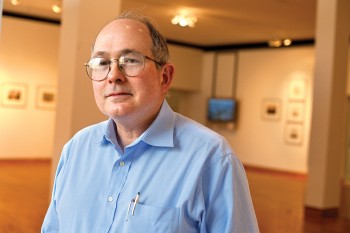END NOTE

Kieran Donaghy See larger image
Why collaborating across boundaries is a new career path for researchers
Career advancement for a faculty member at a major research university like Cornell has usually required single-minded pursuit of a narrow research program in a single discipline. This state of affairs is becoming less dominant.
While following such an approach can still lead to individual success, it contributes little to the solution of many of the most challenging problems now facing global society: adapting to and mitigating the effects of climate change, solving the health, nutritional and infrastructure problems in desperately poor countries and resolving long-festering geopolitical conflicts. None of these critical problems is likely to be resolved without the engagement and collaborative efforts of numerous scholars working across disciplinary lines.
The most encouraging example to date of promoting such cross-disciplinary connections among researchers at Cornell is the recently announced gift of $80 million by David Atkinson '60 and his wife, Patricia, to create and permanently fund the David R. Atkinson Center for a Sustainable Future. The new research center will involve chemists, economists, biologists and sociologists focusing on challenges in the global energy, environmental and economic development arenas.
The center is an outgrowth of a pilot program (the Cornell Center for a Sustainable Future) established in 2007 by then Provost Carolyn "Biddy" Martin, and funded by a $3 million gift from the Atkinsons, to help advance multidisciplinary research and cultivate innovative collaborations within and beyond Cornell to foster a sustainable future. One of the program's initial mandates was to facilitate strategic faculty hiring in the three thematic areas of energy, environment and economic development. The program quickly announced a plan for strategic faculty hiring in sustainability that would provide bridging and startup funding to colleges and departments committing faculty lines to areas of particular strategic importance to the broader Cornell community.
Martin had long been an advocate for interdisciplinary research. In the early 2000s she initiated a program of cluster hires in the life sciences. She believed that by recruiting clusters of researchers, or teams in allied but different disciplines, the university could enhance its ability to take the lead in some of the most challenging problems in the life sciences. An unusual feature of the faculty recruitment program was that it left to the newly recruited researchers the choice of which department to join. By most accounts this program has been very successful in attracting and retaining working groups of top-flight scholars.
In the same way, the new sustainability center will use its funding to promote cluster hiring across disciplines. However, the connections between scholars will need to be more problem-defined, with multiple units across colleges deciding which areas to focus on. New recruits will still be able to select their home departments, within a specified range.
The first focus area defined under the pilot program in 2008 was climate change, falling within the College of Agriculture and Life Sciences. The second was related to energy supply, distribution and end use, in association with the College of Engineering's efforts to establish an energy institute. In 2009 focus groups of faculty members developed seven strategic hiring proposals. Four of these proposals have been approved by the faculty advisory committee of the center, and cluster hires will proceed in the critical areas of biodiversity, boundary layer and coastal fluid dynamics, environmental economics and sustainable enterprise, and sustainable systems. Searches will be authorized once college and departmental commitments of faculty lines and bridge funding availability have been confirmed.
Thanks to the Atkinsons' additional generous gift to the university and to the new sustainability center, the future of cross-disciplinary research in the area of sustainability is looking particularly bright.
Kieran Donaghy is professor and chair of the Department of City and Regional Planning and the director of graduate studies in the Field of Regional Science. He has been a member of the Atkinson Center for a Sustainable Future's Faculty Advisory Committee since the inception of the center.